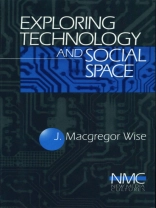Examining the fundamental assumptions that we hold about the role of technology in our lives, Technology and Social Space describes the possibilities and limitations of human agency within the new wired world. In a patient and thoughtful style, author J. Macgregor Wise elaborates a critical, philosophical, and epistemological framework from which to better understand our relations to technology and social space. The book argues that most treatments of technology and society arise from a modernist episteme (or set of assumptions) that radically separates humans from technologies, focusing on questions of determination and identity. In an attempt to provide a clearer view of technology and social space, the book explores alternative perspectives centered on notions of agency. Working from within these alternative epistemes, the book turns its attention to the burgeoning technological assemblage of communication and information characterized by the Internet and cyberspace. Technology and Social Space draws on the philosophy of Deleuze and Guattari and the actor-network sociology of Bruno Latour, and brings together diverse examples from cyborg films, television, museums, cyberspace, and debates over a New World Information and Communication Order. Ultimately, the book describes the possibilities and limitation of human agency within the new wired world. This groundbreaking volume will be of interest to professionals and academics in popular culture, media studies, mass communication, and sociology.
Jadual kandungan
EPISTEME
Introduction
Slouching towards Tralfamadore
The Modern Episteme
Beyond the Modern Episteme
Space and Agency in the Land of the Cyborgs
Living in a Deleuzian World
ASSEMBLAGE
Making Television, Making History
AT&T Builds the Bomb
Communications
From SDI to NII through the MSI
Welcome to Your Assemblage
It′s a Small World After All
Rethinking the NIICO and the GII
Conclusion
Technology is License to Forget












